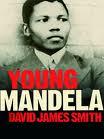Posted on September 16, 2010

Once I got beyond some of the clunky writing of the first pages I was rewarded for my efforts. Smith gives us a biography that juxtaposes Mandela's version of his family history as given in Long Walk to Freedom with what the archives offer. He shows both how Mandela chooses to remember his relationships "his father and his father's career as a chief; his relationship with his mother; and himself as a husband and a father" and how official documentation and others' memories sometimes counter his. Smith peels back the layers of Mandela's silence around the dissolution of his first marriage, the deaths of his two sons and the troubled relationships that he has with most of his children and grandchildren. Much of the book details the ways in which both Mandela's first and second wives, Evelyn and Winnie, and their children felt sacrificed by Mandela on the altar of the struggle. Before the Treason Trial, Smith writes, "Winnie felt she was a sacrifice to the cause. Marrying Madiba - she never called her husband Nelson as that would have been too familiar...marrying Madiba was marrying the ANC". A little further on, he explains that when Mandela went underground he never actually told Winnie: "[i]n Winnie's recollection he came home from the Treason Trial one day in March 1961...he did not actually come into the house but stood outside the gate"Â and "[Joe] Modise came to her...and said, Mama, can you please get me a suitcase and pack a few clothes for Madiba?"Â(181). Winnie reportedly had no illusions about the life she would have with Mandela, "[i]t was a cause ... and the fight for dignity, the fight for your work, was much bigger than your personal life"Â. Yet almost simultaneously she expresses loss and anger about his betrayal of their personal lives: he was never there for the birth of their daughters.
Even less known to us are the facts of his first marriage beyond the fleeting reference to Evelyn taking the curtains from 8115 Orlando West in Long Walk to Freedom. Smith takes us inside the story. From his account they were a young, upwardly mobile couple "Evelyn a nurse and Mandela studying to become an advocate" thwarted by Mandela's philandering and Evelyn's attempt to study and qualify in midwifery. The struggle and Evelyn's increasing devotion to her religion seem far less central to the demise of their relationship here than Mandela alludes in Long Walk. On the day of Mandela's release Evelyn is reported to have said that "People worship Nelson too much".
Interestingly, the Mandela family histories that Mandela's children and grandchildren tell is inflected with their sense of whether or not their mother/grandmother was wronged or sidelined by Mandela or in the case of Evelyn and her children (Thembi, Mokgatho and Makaziwe), by Mandela's 'official' family (Winnie, Zindzi and Zenani).
Young Mandela is not a biography meant to tarnish or destroy Mandela's legacy 'that would be opportunistic' but to restore his humanness by showing us some of his youthful foibles. I think, by putting them into public discourse Smith asks us to think about the nature of family in South Africa and what its implications are for how we 'do'Â democracy on the street, in parliament and in the home.
David James Smith's Young Mandela, Orion Publishing, 2010
Victoria Collis-Buthelezi is a doctoral candidate at Columbia University, New York, and an associate of the Research Initiative in Archive and Public Culture at the University of Cape Town.